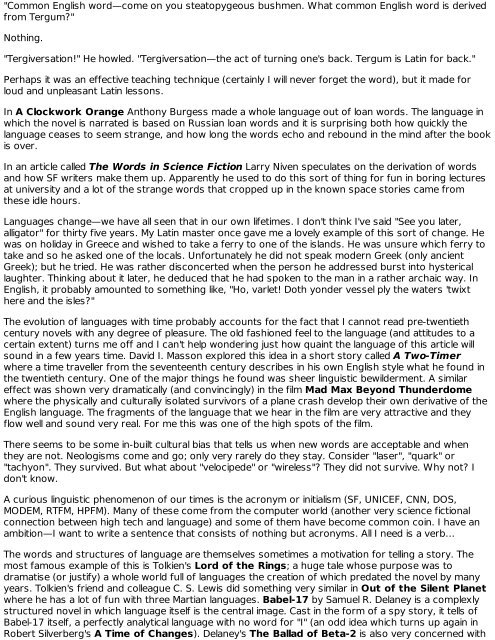Triffids Beard 2 - The Bearded Triffid
Triffids Beard 2 - The Bearded Triffid
Triffids Beard 2 - The Bearded Triffid
You also want an ePaper? Increase the reach of your titles
YUMPU automatically turns print PDFs into web optimized ePapers that Google loves.
"Common English word—come on you steatopygeous bushmen. What common English word is derived<br />
from Tergum?"<br />
Nothing.<br />
"Tergiversation!" He howled. "Tergiversation—the act of turning one's back. Tergum is Latin for back."<br />
Perhaps it was an effective teaching technique (certainly I will never forget the word), but it made for<br />
loud and unpleasant Latin lessons.<br />
In A Clockwork Orange Anthony Burgess made a whole language out of loan words. <strong>The</strong> language in<br />
which the novel is narrated is based on Russian loan words and it is surprising both how quickly the<br />
language ceases to seem strange, and how long the words echo and rebound in the mind after the book<br />
is over.<br />
In an article called <strong>The</strong> Words in Science Fiction Larry Niven speculates on the derivation of words<br />
and how SF writers make them up. Apparently he used to do this sort of thing for fun in boring lectures<br />
at university and a lot of the strange words that cropped up in the known space stories came from<br />
these idle hours.<br />
Languages change—we have all seen that in our own lifetimes. I don't think I've said "See you later,<br />
alligator" for thirty five years. My Latin master once gave me a lovely example of this sort of change. He<br />
was on holiday in Greece and wished to take a ferry to one of the islands. He was unsure which ferry to<br />
take and so he asked one of the locals. Unfortunately he did not speak modern Greek (only ancient<br />
Greek); but he tried. He was rather disconcerted when the person he addressed burst into hysterical<br />
laughter. Thinking about it later, he deduced that he had spoken to the man in a rather archaic way. In<br />
English, it probably amounted to something like, "Ho, varlet! Doth yonder vessel ply the waters 'twixt<br />
here and the isles?"<br />
<strong>The</strong> evolution of languages with time probably accounts for the fact that I cannot read pre-twentieth<br />
century novels with any degree of pleasure. <strong>The</strong> old fashioned feel to the language (and attitudes to a<br />
certain extent) turns me off and I can't help wondering just how quaint the language of this article will<br />
sound in a few years time. David I. Masson explored this idea in a short story called A Two-Timer<br />
where a time traveller from the seventeenth century describes in his own English style what he found in<br />
the twentieth century. One of the major things he found was sheer linguistic bewilderment. A similar<br />
effect was shown very dramatically (and convincingly) in the film Mad Max Beyond Thunderdome<br />
where the physically and culturally isolated survivors of a plane crash develop their own derivative of the<br />
English language. <strong>The</strong> fragments of the language that we hear in the film are very attractive and they<br />
flow well and sound very real. For me this was one of the high spots of the film.<br />
<strong>The</strong>re seems to be some in-built cultural bias that tells us when new words are acceptable and when<br />
they are not. Neologisms come and go; only very rarely do they stay. Consider "laser", "quark" or<br />
"tachyon". <strong>The</strong>y survived. But what about "velocipede" or "wireless"? <strong>The</strong>y did not survive. Why not? I<br />
don't know.<br />
A curious linguistic phenomenon of our times is the acronym or initialism (SF, UNICEF, CNN, DOS,<br />
MODEM, RTFM, HPFM). Many of these come from the computer world (another very science fictional<br />
connection between high tech and language) and some of them have become common coin. I have an<br />
ambition—I want to write a sentence that consists of nothing but acronyms. All I need is a verb…<br />
<strong>The</strong> words and structures of language are themselves sometimes a motivation for telling a story. <strong>The</strong><br />
most famous example of this is Tolkien's Lord of the Rings; a huge tale whose purpose was to<br />
dramatise (or justify) a whole world full of languages the creation of which predated the novel by many<br />
years. Tolkien's friend and colleague C. S. Lewis did something very similar in Out of the Silent Planet<br />
where he has a lot of fun with three Martian languages. Babel-17 by Samuel R. Delaney is a complexly<br />
structured novel in which language itself is the central image. Cast in the form of a spy story, it tells of<br />
Babel-17 itself, a perfectly analytical language with no word for "I" (an odd idea which turns up again in<br />
Robert Silverberg's A Time of Changes). Delaney's <strong>The</strong> Ballad of Beta-2 is also very concerned with


